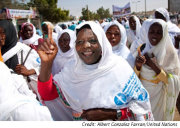
|
 Women's Human Rights: From Slogan to Global Agenda Women's Human Rights: From Slogan to Global Agenda
I first heard the expression "women's rights are human rights" as the name of a campaign launched in 1988 in the Philippines by GABRIELA, a women's coalition that emerged from the anti-Marcos struggles. It immediately clicked as a succinct way of expressing what many of us were saying. This short phrase was catchy and proactive and made the case for women's rights in terms of human rights law, concepts, and practices--instead of asking permission from others to include us. Of course, adopting an effective tagline was the easy part. Making a slogan a reality for billions of women turned out to be much harder.
The first mobilizing tool for what became the Global Campaign for Women's Human Rights was a short 1991 petition to the United Nations World Conference on Human Rights to be held in Vienna in 1993 that asserted, "Violence against women violates human rights."
These simple but powerful words touched a nerve and helped to spark a movement that was revolutionary in its consequences for women. When the agenda for the Vienna conference was first drawn up, women and gender were nowhere to be found on it, and violence against women was not contemplated as a human rights concern. But by the time the petition was presented on the floor at the world conference less than two years later, women's rights had become a central theme. The petition had been translated into twenty-three languages, was sponsored by more than a thousand organizations in 124 countries, and had garnered half a million signatures, including thumbprints from illiterate women--bearing witness to the truth it spoke.
In a pre-Internet era, the rapid movement of the petition by hand, letter, or--for a privileged few--sparkling new fax machine reflected the emergence of the women's movement as a global political force. However, the petition was not just to be signed. It was an organizing tool for feminists to provoke a discussion of why human rights were not already systematically seen as including women's rights, as well as to mobilize women around the world to make their voices heard.
Framing women's rights in terms of human rights, as expressed by the phrase "women's rights are human rights," was an idea and a movement whose time had come. It came simultaneously from more than one source, but it began to bubble to the surface in the context of the global feminist movement of the 1980s. This was a formative time for feminists in our development as women's human rights activists.
(2012-03-11/womensenews)
|





